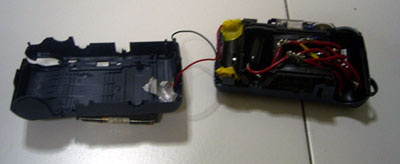|
26 Joule Single Stage
Coil Gun Learning Project 2
(With
Video!)
Coil Gun
1B (Click images to view full)
July 2003
|
Introduction and Project
Aims
After successful firings with
Coil Gun 1A, I decided to build a
second, higher energy prototype coil gun. It still is a single stage
coilgun, but with two times the power of my previous prototype. The
goal is to achieve higher projectile speeds with more power and using
a flash tube as a switch. |
|

Various components used in making Coilgun 1B. Thin wire for
battery connections and charging wires to capacitors. Thicker wire
for current discharge into the coils to reduce resistance.
Insulating tape to insulate exposed connections which may cause a
short. Reel of solder for size comparison. 4 photoflash capacitors
taken out from other disposable cameras, and the circuit board of
the charging unit.
|
|
Power Source and Charging
I decided to use the same type of
capacitors as Coil gun 1A, but more capacitors - 4 electrolytic
photoflash capacitors wired in parallel and fitted inside a disposable
camera as a base. All capacitors are rated 330VDC and store 120uF
charge each. This amounts to 330^2 x 0.5 x 0.00012 = 6.534 joules each
and around 26 Joules total. The power is little, but 16Js can be
lethal! The capacitors are charged using the charging circuit which
came inside the disposable camera unit. However, the little power
supply takes extremely long to charge 4 times its rated amount, so I
wired 2 batteries, instead of 1 battery to increase charging speed.
|
|

All capacitors stuffed
and wired up inside the casing.
|
Switching
Unlike Coil gun 1A, I decided not
to use a spark-gap switch. Spark gap switches are loud, and has two
exposed electrodes directly connected to the capacitor bank, which is dangerous.
Furthermore, it takes two hands to activate. Therefore, I decided to
use the flash tube as a trigger. Although inefficient, it will allow
me to use a single button push trigger, and will be quiet. I was
rather concerned about sending so much power (4 capacitor instead of
1) through it, but it held up well. The first flash-tube actually
exploded probably due to overheating (picture on right), but
subsequent tests allowed to tube to cool for a while before further
firings. Although inefficient, it is cheap and easy to make.
directly connected to the capacitor bank, which is dangerous.
Furthermore, it takes two hands to activate. Therefore, I decided to
use the flash tube as a trigger. Although inefficient, it will allow
me to use a single button push trigger, and will be quiet. I was
rather concerned about sending so much power (4 capacitor instead of
1) through it, but it held up well. The first flash-tube actually
exploded probably due to overheating (picture on right), but
subsequent tests allowed to tube to cool for a while before further
firings. Although inefficient, it is cheap and easy to make. |
| |
Coil form, Barrel and Projectile
*Two coil forms were made.
Coil 1.
Using the same design as coilgun
1a, I used slightly thicker wire, with more turns, around a pen tube.
The projectile is just a piece of metal. It didn't perform very well,
so I proceeded to build a second coil... The second coil had more
layers, but as shorter, and the barrel was an ink-tube. The projectile
is a small wood nail with the head cut off. This finally produced
better results a the nail had power to pierce through 1 sheet of news
paper, or stick into styrofoam.

Coilgun 1B with the
first and second coil. |
| |
|
Results and Videos
Click
HERE
to watch a 204kb .wmv video (Windows Media Player required to
play) of the assembled prototype firing at full power. (or you can
right click, save target as).
Here, the projectile is being
shot at a styrofoam board. The flash is caused by the flash trigger. I
love the fact that it is totally quiet when firing! Enjoy the video!
|
|

